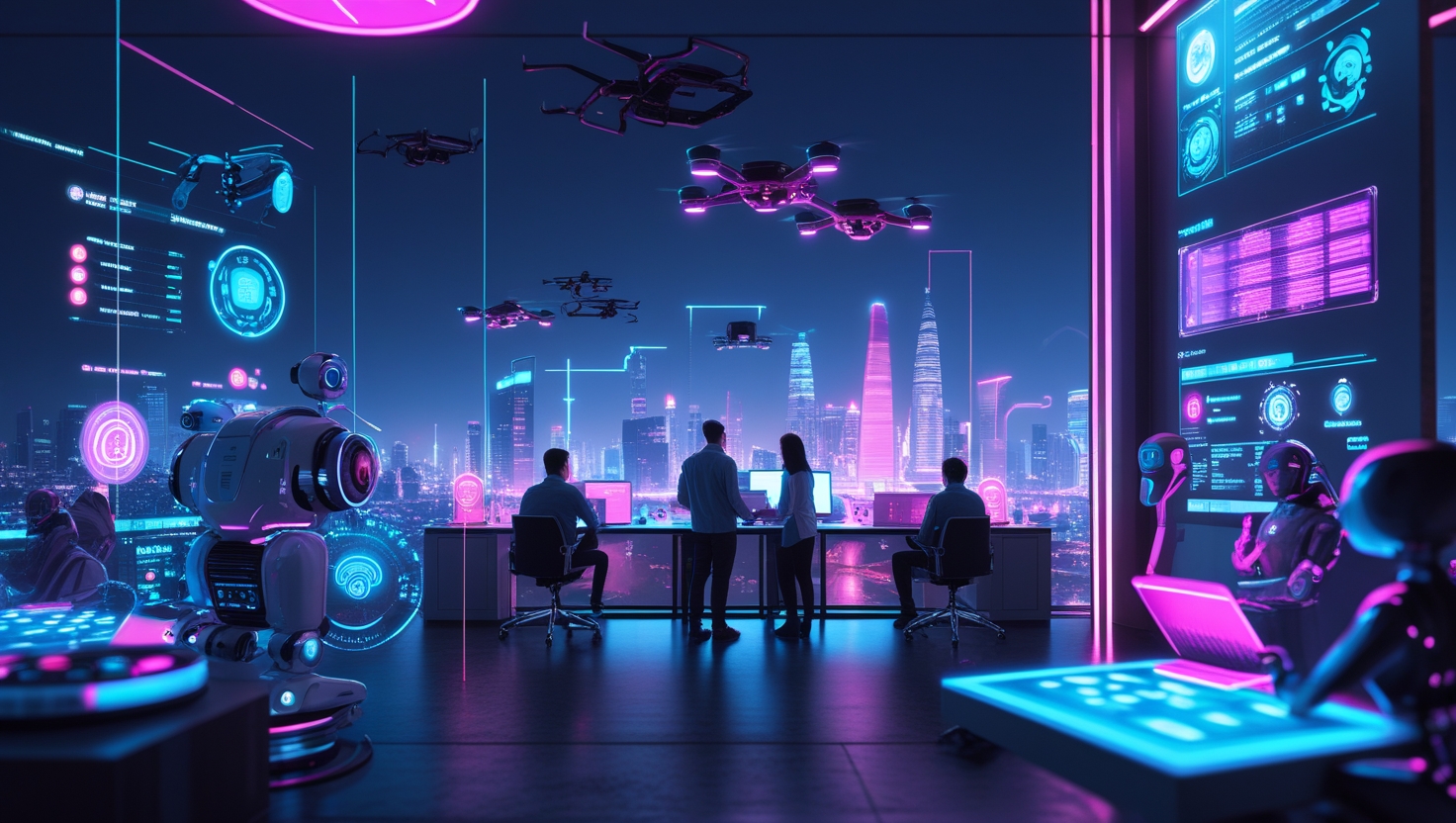The technological panorama of 2025 will have remarkable improvements in synthetic intelligence, blockchain, sustainability, location exploration, and biotechnology. Startups are spearheading those improvements, leveraging modern technology to cope with complex, international, demanding situations. From AI-pushed healthcare diagnostics to blockchain-enabled monetary structures and eco-aware power answers, those corporations are reshaping industries while attracting significant investment. This film examines the most impactful startups and tendencies throughout key sectors, providing a complete evaluation of their technological breakthroughs, marketplace ability, and societal implications.

- Emerging Tech Startups 2025 in AI: Revolutionizing Industries Through Adaptive Learning
- How Emerging Tech Startups 2025 Are Transforming AI Industries
- Blockchain and Web3: Building the Decentralized Digital Economy
- Tokenization and Financial Innovation
- Green Technology: Accelerating the Global Sustainability Transition
- Renewable Energy and Circular Systems
- Space Technology: Democratizing Access to the Final Frontier
- Sustainable Space Exploration and Satellite Innovation
- Biotechnology: Engineering Life on the Molecular Level
- Personalized Medicine and Longevity Research
- Cross-Sector Trends Defining 2025's Innovation Ecosystem
- Ethical Technology Governance
- Convergence of Physical and Digital Realms
- Conclusion: Navigating the Next Frontier of Technological Progress
- FAQs
Emerging Tech Startups 2025 in AI: Revolutionizing Industries Through Adaptive Learning
The AI region continues its exponential boom, with startups refining gadget-mastering fashions to attain human-like reasoning and enterprise-unique optimization. The international AI market is projected to achieve $243.7 billion by 2025, driven by a compound annual growth rate of 27.67% 2. Advancements in natural language processing, predictive analytics, and ethical AI frameworks have fueled this increase.
How Emerging Tech Startups 2025 Are Transforming AI Industries

Perplexity AI exemplifies this increase, tripling its valuation to $nine billion following a $500 million Series C round 7. Using models like GPT-4o and Claude 3, its conversational search engine demonstrates how AI enhances statistics accessibility for 10 million month-to-month users. Similarly, Deepgram is revolutionizing voice recognition with its Series B-funded platform, processing speech facts at unheard-of accuracy for applications ranging from customer support to medical dictation 7.
In healthcare, startups like Canurta accelerate botanical drug discovery through AI-driven molecular evaluation, decreasing development timelines from years to months 1. Meanwhile, Adaptive Bio employs system learning to engineer proteins with precise functional homes, allowing breakthroughs in biomanufacturing and healing improvement 1. The moral size of AI remains essential, with initiatives like the EU’s AI Act prompting startups to combine transparency protocols and bias mitigation techniques directly into their architectures 9.
Blockchain and Web3: Building the Decentralized Digital Economy
The blockchain era has evolved past cryptocurrency, with 2025 witnessing institutional adoption throughout finance, supply chains, and virtual identification control. The Web3 marketplace is developing at 49.3% CAGR, propelled by $2 billion in Q3 2024 investments. Startups are bridging conventional industries with decentralized answers supported by regulatory shifts like the U.S. “crypto reserve” initiative.
Tokenization and Financial Innovation
Redefine is remodeling decentralized finance (DeFi) via its AI-powered risk assessment platform, permitting more secure participation in lending protocols and liquidity pools 1. Trackcol presents real-time blockchain monitoring for delivery chains on the agency front, ensuring transparency in industries like prescription drugs and luxury goods 1. Visa’s experimental platform, which tokenizes fiat currencies for blockchain interoperability, highlights how legacy establishments adopt startup-pushed improvements.
Non-fungible tokens (NFTs) are gaining utility past artwork, with startups like DemoSquare deploying AI to investigate political sentiment records, growing verifiable NFT datasets for policymakers and researchers 1. Privacy-targeted networks like ZeroTier are also gaining traction, securing 2 million monthly devices via encrypted peer-to-peer architectures 7.
Green Technology: Accelerating the Global Sustainability Transition
Climate tech startups secured document investment in 2025, driven by worldwide net-zero commitments and carbon pricing mechanisms. The zone’s growth is exemplified by HGenium, which produces green hydrogen via advanced electrolysis structures, attaining value parity with fossil-derived hydrogen 1 4. DMAT addresses production emissions with self-healing concrete that mineralizes CO2 through curing, potentially lowering cement-related emissions by using 40% 1.
Renewable Energy and Circular Systems
OXCCU stands proud for converting captured carbon into jet gasoline and bioplastics, partnering with airlines to create closed-loop emission structures 1. Seabex optimizes irrigation via IoT sensors and gadgets studying agriculture, reducing water utilization by up to 60% in arid regions 1. The round financial system is also advanced via FlexSea, whose seaweed-based biopolymers decompose in weeks, offering possible options for single-use plastics 1.
Investors are mainly attracted to startups merging AI with sustainability. Element Zero, for instance, uses system learning to eliminate carbon emissions from mineral processing, potentially revolutionizing aluminum and steel manufacturing 1.
Space Technology: Democratizing Access to the Final Frontier
The global space economy, projected to attain $1.Eight trillion by 2035 is being reshaped with startups offering value-effective release structures and in-orbit services 5. Agnikul leads this charge with its three-D-revealed Agnilet engines, which reduce small satellite release charges by 70% compared to traditional rockets 5. The Indian startup’s collaboration with ISRO underscores the growing synergy among countrywide corporations and personal innovators.
Sustainable Space Exploration and Satellite Innovation
U.K.-primarily based Orbex prioritizes environmental sustainability with its Prime rocket, using bio-propane to slash emissions by 90% compared to kerosene fuels 5. HALO Space is pioneering high-altitude balloon launches for microsatellites, supplying a low-price alternative for Earth commentary and atmospheric studies. 5. Meanwhile, Pythom makes a specialty of reusable spacecraft for asteroid mining, aiming to extract rare metals even as it tests planetary defense technology 1.
Satellite constellations are getting brighter through AI integration. Startups like Captain’s Eye rent neural networks to research maritime satellite statistics, detecting illegal fishing and piracy in actual time 1.
Biotechnology: Engineering Life on the Molecular Level
Biotech startups are merging AI, gene editing, and artificial biology to tackle sicknesses and environmental challenges. Candid Therapeutics emerged as a 2025 standout, securing $370 million to develop T-mobile engagers that selectively deplete autoimmune B-cells 6. Their lead candidate, CTX-101, shows promise in treating lupus and rheumatoid arthritis with fewer side effects than vast immunosuppressants.
Personalized Medicine and Longevity Research
Anavex Life Sciences is advancing an Alzheimer’s remedy with its sigma-1 receptor agonist, currently under EMA evaluation following high-quality Phase III effects 6. In longevity technology, Life Biosciences is focused on mobile reprogramming to reverse age-associated vision loss, with preclinical studies demonstrating retinal tissue regeneration 6.
The convergence of biotech and AI is most evident at Adaptyv Bio, where devices learning about fashions expect protein folding patterns, enabling the layout of enzymes that digest plastic waste 1. Fishway complements those efforts with lab-grown salmon fillets, accomplishing 90% lower carbon emissions than traditional aquaculture 1.
Cross-Sector Trends Defining 2025’s Innovation Ecosystem
Ethical Technology Governance
As AI and biometric technologies proliferate, startups face increasing pressure to embed moral safeguards. The EU’s AI Act and California’s Algorithmic Accountability Act have spurred tools like Defendis’s AI audit platform, which scans system learning fashions for bias and compliance risks 1 9. Similarly, MetaLedger offers blockchain-based total consent management systems, allowing users to manipulate private fact usage throughout platforms.
Convergence of Physical and Digital Realms
Startups are erasing limitations between industries. Levigate Alloys exemplifies this by combining AI-pushed material and technological know-how with 3-D printing to create high-energy metal powders for aerospace and medical implants 1. In retail, Titanium Textiles collaborates with AI-powered retail Assistance startups to supply clever fabric that alters insulation based on climate facts 1 2.
Conclusion: Navigating the Next Frontier of Technological Progress
The startup panorama of 2025 displays a world in which technological ambition is tempered by ethical duty and environmental stewardship. From Perplexity AI’s democratization of know-how to Agnikul’s sustainable area, which gets the right of entry, those agencies show that innovation can force each income and societal gain. Investors and policymakers must support disruptive technologies with robust governance frameworks, ensuring breakthroughs in AI, blockchain, and biotechnology uplift worldwide groups in preference to exacerbating inequalities. As those startups mature, their success will hinge on preserving agility whilst scaling effect—an undertaking that will outline the next decade of technological evolution.
FAQs
1. What is the core change transforming startups in 2025?
Startups in 2025 are prompted by:
- AI and Automation: AI drives efficiencies in selection-making, operations, and consumer engagement.
- Decentralization: Remote-first startups leveraging global expertise swimming pools.
- Sustainability: Green tech and solutions are vital to many startups’ missions.
- Blockchain Applications: Beyond cryptocurrencies, blockchain is getting used to deliver chain transparency, decentralized finance (DeFi), and digital identities.
- Metaverse Expansion: Virtual real estate and digital identity solutions are gaining traction 1 2 4.
2. Which industries are seeing the quickest boom in startups?
Key industries consist of:
- AI: Firms like Perplexity AI are emerging with novel generative AI tools.
- Green Tech: How startups such as Redwood Materials and Climeworks support sustainability.
- Biotechnology: BioNTech and Ginkgo Bioworks are transforming health care and artificial biology.
- Space Tech: Companies including Agnikul and Orbex are leading improvements in reusable rockets and satellite TV for PC systems 2 3 4.
3. What role does sustainability play in 2025 startups?
Sustainability in 2025 Startups: Why It Matters Sustainability is a first-class cognizance, and startups are placements all of the strengths—eco-friendly products, renewable power answers, carbon capture technology, and circular financial system improvements. Investors increasingly desire companies with sturdy ESG (Environmental, Social, Governance) techniques 1 2.
4. How is blockchain technology being utilized by startups?
Blockchain is being carried out to:
- Decentralized finance (DeFi) systems for bypassing conventional banking structures.
- Supply chain control for more desirable transparency and authenticity.
- NFT marketplaces for virtual property in gaming, artwork, and past 1 2.
5. What demanding situations will startups face in 2025?
Despite fast innovation, startups stumble upon demanding situations along with:
- Limited challenge capital due to higher interest charges.
- Regulatory complexities, especially in AI and blockchain sectors.
- Competition for skilled expertise amidst a globalized body of workers 3 4.
6. Which startup has proven a sizeable increase currently?
Perplexity AI stands proud with a 7,200% growth rate over five years, elevating $500 million in Series C funding and reaching a $ 9 billion valuation through 2025 3.


